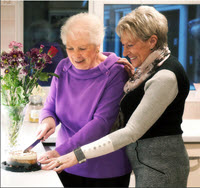Guide to better understand people with dementia – The Good Care Group
The Good Care Group offer high quality live in care services, for elderly people to live in their home for as long as possible. Their eye-opening and educational dementia guide offers a ‘person-centred’ analysis of the lives of those affected by dementia, offering guidance on how you can help and support individuals with dementia live well.
The Good Care Group provides the reader with a compelling and informative resource, suitable for all those whose lives have been affected by dementia.
Understanding dementia
Dementia is a “collection of syndromes resulting from damage to the brain”, Alzheimer’s being the most common type of dementia.
Memory, thinking speed, mental agility, understanding and judgement are all functions that can be affected by dementia. The Good Care Group highlight that although these symptoms are common amongst most individuals with dementia, the rate of progression varies from person to person and is dependent on the type of dementia, as well as the overall health and lifestyle of the individual. The Good Care Group encourages anyone who is concerned about dementia to seek help by talking to their GP.

Feelings more important than facts
It becomes difficult for people with dementia to store new factual information. However, the feelings that a person experiences do continue to be stored as normal. Therefore a person with dementia will always know how they are feeling, but they may not know why. The guide quotes Christine Bryden, diagnosed at age 46 with Alzheimer’s Disease; “As we become more emotional and less cognitive, it’s the way you talk to us, not what you say, that we remember”.
In the absence of recent factual memories, people with dementia are likely to search for much older factual memories, possibly from youth, to help make sense of their current situation. The guide offers tips on how to effectively communicate with the person, mentioning the importance of creating a calm and relaxed environment, and joining the reality the person is living in rather than constantly contradicting them.
Adopt a ‘Person-First’ approach
The useful guide states we must adapt to a ‘person-first approach’ in the household. Pam Schweitzer proposes that looking through family photos, listening to familiar music and visiting memorable places; may help sustain a better relationship between family and patient, as well as carer. This helps the patient feel at ease by reminiscing over happier memories.
‘Three Golden Rules developed by Contended Dementia – simple, yet highly effective person-first approach, developed
A part of The SPECAL® method, this person centred approach can greatly improve wellbeing and quality of life.
- To avoid asking direct questions
It is important to avoid asking direct question that require factual information, this increases awareness of their disability which in return causes more stress and grief.
- Listen to the expert
It’s important to listen to what the person affected is saying, to base our questions and answers from their perspective; any information they receive should generate good feelings for them.
- Do not contradict
It’s important to not argue with them, we must not sidetrack them from pre-dementia memories, as they are used to make sense of the current moment. We must support and validate what they are saying as being correct.
Assistive Technology and examples
The Good Care Group promotes the use of assistive technology as an aid for greater autonomy.
Helpful technology includes:
- Taking tracking devices on walks, which allow patients to have a greater sense of independence
- Telecare sensors to monitor the person and can notify a nominated person or call centre if they have fallen or have left home during the night
- Introducing adapted versions of household appliances such as doorbells and telephones with larger buttons and bolder colours
It is important to note assistive technology is more effective when introduced in the early stages of dementia; gradual introduction of these technologies can prevent confusion. The guide also states assistive technology is best when combined with a ‘person-centred’ care service.
Download the full guide at:https://www.thegoodcaregroup.com/



